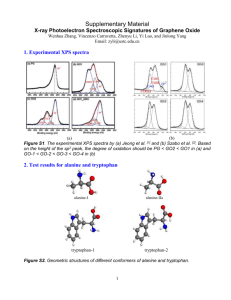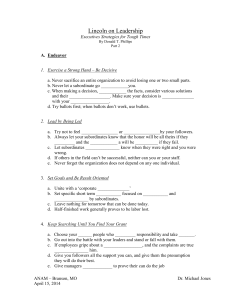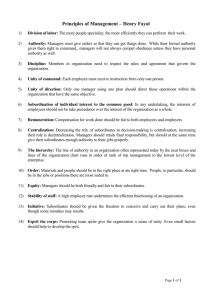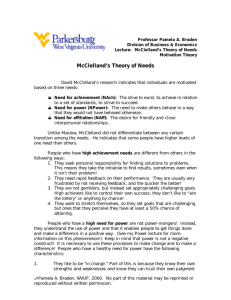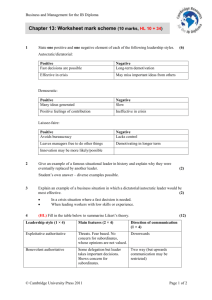Leaders’ Unmet Needs Can Precipitate Power Abuse in Relationships with Followers
advertisement
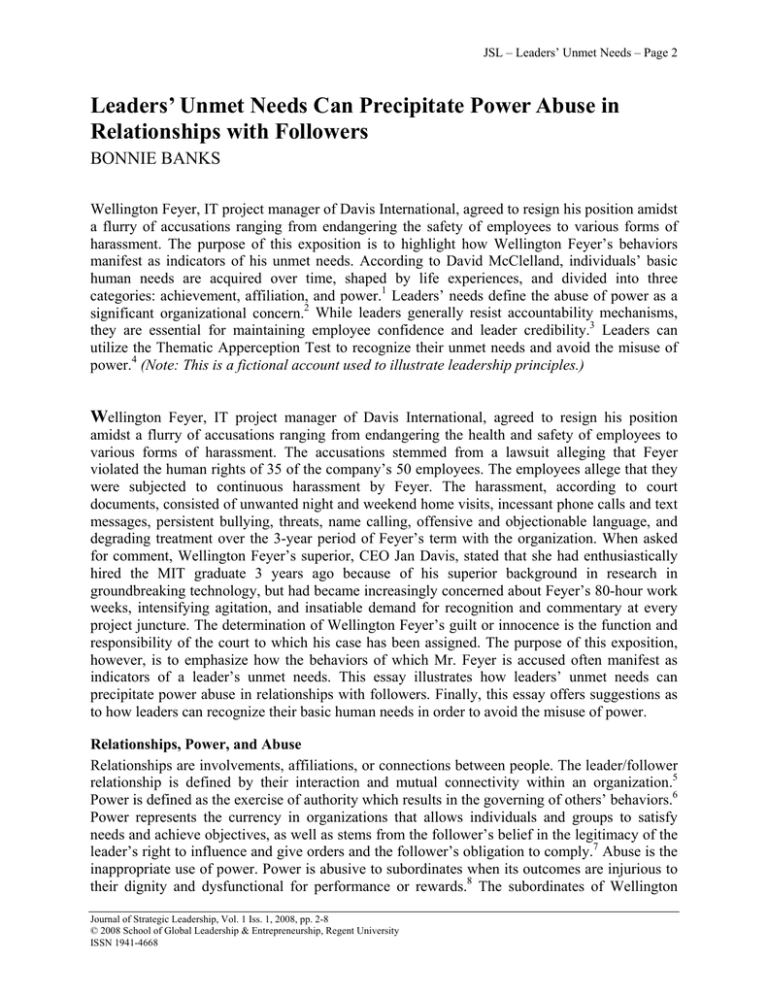
JSL – Leaders’ Unmet Needs – Page 2 Leaders’ Unmet Needs Can Precipitate Power Abuse in Relationships with Followers BONNIE BANKS Wellington Feyer, IT project manager of Davis International, agreed to resign his position amidst a flurry of accusations ranging from endangering the safety of employees to various forms of harassment. The purpose of this exposition is to highlight how Wellington Feyer’s behaviors manifest as indicators of his unmet needs. According to David McClelland, individuals’ basic human needs are acquired over time, shaped by life experiences, and divided into three categories: achievement, affiliation, and power.1 Leaders’ needs define the abuse of power as a significant organizational concern.2 While leaders generally resist accountability mechanisms, they are essential for maintaining employee confidence and leader credibility.3 Leaders can utilize the Thematic Apperception Test to recognize their unmet needs and avoid the misuse of power.4 (Note: This is a fictional account used to illustrate leadership principles.) Wellington Feyer, IT project manager of Davis International, agreed to resign his position amidst a flurry of accusations ranging from endangering the health and safety of employees to various forms of harassment. The accusations stemmed from a lawsuit alleging that Feyer violated the human rights of 35 of the company’s 50 employees. The employees allege that they were subjected to continuous harassment by Feyer. The harassment, according to court documents, consisted of unwanted night and weekend home visits, incessant phone calls and text messages, persistent bullying, threats, name calling, offensive and objectionable language, and degrading treatment over the 3-year period of Feyer’s term with the organization. When asked for comment, Wellington Feyer’s superior, CEO Jan Davis, stated that she had enthusiastically hired the MIT graduate 3 years ago because of his superior background in research in groundbreaking technology, but had became increasingly concerned about Feyer’s 80-hour work weeks, intensifying agitation, and insatiable demand for recognition and commentary at every project juncture. The determination of Wellington Feyer’s guilt or innocence is the function and responsibility of the court to which his case has been assigned. The purpose of this exposition, however, is to emphasize how the behaviors of which Mr. Feyer is accused often manifest as indicators of a leader’s unmet needs. This essay illustrates how leaders’ unmet needs can precipitate power abuse in relationships with followers. Finally, this essay offers suggestions as to how leaders can recognize their basic human needs in order to avoid the misuse of power. Relationships, Power, and Abuse Relationships are involvements, affiliations, or connections between people. The leader/follower relationship is defined by their interaction and mutual connectivity within an organization.5 Power is defined as the exercise of authority which results in the governing of others’ behaviors.6 Power represents the currency in organizations that allows individuals and groups to satisfy needs and achieve objectives, as well as stems from the follower’s belief in the legitimacy of the leader’s right to influence and give orders and the follower’s obligation to comply.7 Abuse is the inappropriate use of power. Power is abusive to subordinates when its outcomes are injurious to their dignity and dysfunctional for performance or rewards.8 The subordinates of Wellington Journal of Strategic Leadership, Vol. 1 Iss. 1, 2008, pp. 2-8 © 2008 School of Global Leadership & Entrepreneurship, Regent University ISSN 1941-4668 JSL – Leaders’ Unmet Needs – Page 3 Feyer asserted that Feyer exploited their leader/follower relationship by abusing his legitimate right to exercise power over them. McClelland’s Theory of Needs According to David McClelland, individuals’ basic human needs are acquired over time, shaped by life experiences, and divided into three categories: achievement, affiliation, and power.9 Achievement-oriented leaders seek challenges at work and are project driven.10 They are high achievers who seek challenges and prefer to work with other achievement-driven individuals. Achievement-oriented leaders experience frustration with subordinates and peers who are less driven than they are.11 Additionally, leaders with a high need for achievement crave feedback on their accomplishments.12 In the absence of feedback, achievement-oriented leaders may experience disappointment. Wellington Feyer is apparently a high achiever. A science and technology graduate of Massachusetts Institute of Technology, Feyer brought his competitive work ethic to Davis International hoping to help the fledgling organization establish itself as a formidable contender for the Bay Area technology market. Feyer took pride in his goal-oriented work ethic and did not limit his contribution to the organization to typical working hours or time spent at the office. He had hoped that his 80-hour work week and rapid turnaround time for projects would demonstrate his dedication to expeditiousness and excellence. Feyer was proud of his achievements. Over the last several months, however, he had grown increasingly irritated with the lack of commitment he perceived in his peers and subordinates and the obvious indifference from his boss. Feyer determined that his subordinates required more oversight and that his superior needed to pay closer attention to his efforts. The Unmet Need for Achievement Although justifiably dedicated to company performance, Feyer’s behavior demonstrates that he was, in reality, seeking to satisfy his unmet needs; one of which was for achievement. Typical of leaders with a high need for achievement, Feyer took on challenging projects and worked diligently to accomplish his goals. However, in so doing, Feyer obliged his subordinates to work with him at his pace without regard for their individual work capacities. Feyer admitted requiring his subordinates to work extra hours, including weekends, and saw nothing wrong with phoning about projects, sending text messages, and visiting his subordinates’ homes for impromptu meetings on their days off. Typical of individuals with a high need for achievement, Feyer became frustrated with the reality that he was working with people who were either less capable or less achievement motivated than he. Feyer had essentially sought to mold his subordinates into mirror images of himself so that his need to work with other high achievers would be met. While a certain degree of narcissistic behavior is characteristic of leaders generally, the danger lies in attempting to force subordinates to become the literal image of the leader.13 Wellington Feyer abused his power in his relationships with his followers by exerting undo pressure upon them to perform beyond their capacities. Affiliation Affiliation-oriented individuals need to be liked.14 They vigorously pursue harmonious relationships with others.15 Objective decision making is usually difficult for affiliation-oriented leaders because they readily conform to group norms often compromising their own view Journal of Strategic Leadership, Vol. 1 Iss. 1, 2008, pp. 2-8 © 2008 School of Global Leadership & Entrepreneurship, Regent University ISSN 1941-4668 JSL – Leaders’ Unmet Needs – Page 4 points.16 In general, individuals with a high need for affiliation tend to avoid leadership positions. 17 Wellington Feyer’s behaviors do not demonstrate that his need for affiliation was unmet. In fact, Feyer appeared not to be concerned about being liked; especially when he made the decision to push his subordinates to demonstrate their commitment to him and the organization at considerable expense to their individual identities and wellbeing. Feyer’s behavior was the antithesis of a person with a high need for affiliation. Feyer was achievement oriented and not needy in the area of cultivating harmonious relationships. While Feyer was not necessarily motivated by a high need for affiliation, his relational capacities with followers were severely lacking and inhibited. Characteristic of a person with a high need for affiliation, Feyer demonstrated difficulty in objective decision-making. Not because he conformed too readily to group norms, but because he was blinded by his quest to satisfy his unmet need for power.18 Power The need for power distinguishes itself into two sub-categories: (a) the need for institutional power and (b) the need for personal power.19 Leaders who have a high need for institutional power focus their energies on organizing the efforts of others for the accomplishment of organizational goals.20 Leaders who have a high need for institutional power generally make more effective leaders than those with a high need for personal power because of their motivation to pursue a unified effort toward organizational success.21 Although attracted to positions of power and influence, leaders with a high need for personal power seek primarily to control others’ behaviors.22 They often lack the required adaptability and emotional intelligence to succeed in such positions.23 The Unmet Need for Power Wellington Feyer’s behaviors demonstrate a high need for personal power. His constant hovering over his subordinates, blatant disregard for their individuality, and dictatorial style made him tyrannical and ineffective. Feyer’s high need for personal power became apparent in his conduct with both subordinates and superiors. In forcing his subordinates to increase their work hours, Feyer sought to control how his subordinates spent the majority of their time. Feyer’s incessant telephone calls, text messages, and home visits also contributed to his insatiable need to establish a commanding presence in his followers’ lives. Feyer calculatingly ensured that his subordinates’ time and energies were consumed with anxieties relating to fulfilling his requests. In addition to over-working them, Feyer further exploited his followers by regularly badgering and intimidating them through degrading treatment. The angst that Feyer cultivated in his subordinates resulted in a lowering their resistance. This paved the way for him to increase the levels of disrespect and humiliation until his followers were completely broken and depleted. In essence, Feyer sought to amass power by neutralizing his followers’ dignity and self-worth through a steady progression of antagonism and fear. Typical of an individual with a high need for personal power, Feyer also sought to fulfill his need through recognition.24 As expressed by Feyer’s superior, CEO Jan Davis, Feyer constantly demanded acknowledgement for his work. Individuals with a high need for personal power crave regular feedback and recognition for their accomplishments.25 Overall, Feyer abused his power in his relationships with others through debasement and vexation. Journal of Strategic Leadership, Vol. 1 Iss. 1, 2008, pp. 2-8 © 2008 School of Global Leadership & Entrepreneurship, Regent University ISSN 1941-4668 JSL – Leaders’ Unmet Needs – Page 5 Implications While the needs for achievement, affiliation, and power are present in most people, there is usually a prevailing orientation that defines one’s dominant need.26 When an individual has unmet needs, the propensity toward satisfying those needs influences and inevitably shapes one’s pursuits and decisions in relationships.27 Although the example of Wellington Feyer is fictional, aspects of his depiction are typical representations of how a leader’s unmet needs can precipitate power abuse in relationships with followers. According to researcher, David Kipnis, power can have the following affects on leaders and followers:28 1. Power can influence leaders to increase their attempts to control the behavior of followers. 2. Power can influence leaders to devalue a follower’s worth. 3. Power can influence leaders to take undeserved credit for a follower’s performance. 4. Power can influence leaders to view followers as objects of manipulation. 5. Power can influence leaders to desire to distance themselves from followers. As Wellington Feyer demonstrated, power abuse begins with volition.29 The decision to abuse power lead Wellington Feyer to the execution of the aforementioned power strategies designed to afflict followers and gratify his need to be in charge. According to French and Raven, there are five main sources of power:30 1. Power based on the ability to grant rewards 2. Power, which is coercive and has the ability to punish 3. Power that is legitimate, which is based on position or authority 4. Referent power, which identifies with who or what the leader represents 5. Power, which is grounded in knowledge or expertise In the case of Wellington Feyer, coercive power was used to influence and control the behaviors of others. Misappropriated reward power, legitimate power, and referent power were also elements in Feyer’s tactics to lord his authority and position over his subordinates. Research demonstrates that leaders who abuse power are often motivated by its value in affecting action and obtaining rewards, its status as a beneficial resource, and its promise of sovereignty.31 Conclusion Leaders’ needs, motivations, and propensities and subordinates' dependencies have risen to define the abuse of power as a significant organizational concern.32 Because of the presence and needfulness of power structures, systems of accountability, and transparency mechanisms, including of codes of conduct and ethical behavioral standards, should be standardized as a first level defensive against power abuse.33 While leaders generally resist accountability mechanisms, they are essential for maintaining employee confidence and leader credibility.34 Secondly, and perhaps most importantly, leaders must learn to recognize their unmet needs and pursue ways of fulfilling those needs that avoid injurious behaviors toward others.35 The Thematic Apperception Test, developed by David McClelland, is a viable and respected Journal of Strategic Leadership, Vol. 1 Iss. 1, 2008, pp. 2-8 © 2008 School of Global Leadership & Entrepreneurship, Regent University ISSN 1941-4668 JSL – Leaders’ Unmet Needs – Page 6 instrument used by leaders to assess personality traits and inclinations.36 Leaders who take the Thematic Apperception Test are likely to discover unconscious aspects of their personality that reveal hidden motives and needs for achievement, affiliation, and power. It is quite possible that Wellington Feyer would deny his high need for personal power and defer instead to his strong work ethic and frustration with lazy subordinates. It is also possible that Feyer would mildly acknowledge his degrading treatment of others as his need to slow down and not be so easily provoked by others’ ineptitude. Like Feyer, leaders generally may not always perceive themselves as they present themselves to others. Therefore, it is imperative for leaders’ personal integrity, character, respect for the positions they hold, and the dignity of those they supervise to honestly examine themselves. By appraising one’s needs through the Thematic Apperception Test, or other reliable instrument, a leader may be able to indentify unmet needs. Once a leader establishes his unmet needs the process can begin to examine the motives behind leadership career choices and the dominant personality traits that influence behavior. Leaders with a high need for institutional power possess the self-knowledge, people skills, and general emotional intelligence to cultivate a culture of freedom, creativity, and transformation in organizations.37 As such, they are generally more successful as leaders than those with a high need for personal power because leaders with a high need for personal power tend to lack flexibility and people skills.38 Leaders with a high need for institutional power have been shown to be more effective than leaders with a high need for affiliation because leaders with a high need for affiliation tend to prioritize harmony in their relationships above objective decision-making.39 Leaders with a high need for institutional power may also be more effective than those with a high need for achievement because leaders with a high need for achievement tend to avoid conflict and can be risk averse.40 Notwithstanding the possibilities that no dominant trait may yield all the necessary ingredients for exemplary leadership, and that savvy leaders learn to surround themselves with people who possess complementary strengths, leaders in every category have the responsibility to exercise power appropriately and with respect for the dignity of others. It is morally imperative that leaders begin to recognize their unmet needs and make every responsible effort to address them in ways that avoid the abuse of power in relationships with followers. Journal of Strategic Leadership, Vol. 1 Iss. 1, 2008, pp. 2-8 © 2008 School of Global Leadership & Entrepreneurship, Regent University ISSN 1941-4668 JSL – Leaders’ Unmet Needs – Page 7 Endnotes 1 Net MBA Business Knowledge Center. (2007). McClelland's theory of needs. Retrieved April 4, 2008, from http://www.netmba.com/mgmt/ob/motivation/mcclelland/ 2 Vredenburgh, D., & Brender, Y. (1998, September). The hierarchical abuse of power in work organizations. Journal of Business Ethics, 17(12), 1337. 3 Keohane, R. O. (2005, Summer). Abuse of power. Harvard International Review, 27(2), 48. 4 McIntosh, G. L., & Rima, Sr., S. D. (1997). Overcoming the dark side of leadership: The paradox of personal dysfunction. Grand Rapids: Baker Books. 5 Gasaway, R. B. (2006, July). The leader-follower relationship. Fire Engineering [H.W.Wilson – AST], 159(7), 12. 6 Braynion, P. (2004). Power and leadership. Journal of Health Organization and Management, 18(6), 447. 7 Braynion. (2004). 8 Net Vredenburgh & Brender. (1998, September). 1337. 9 Net MBA Business Knowledge Center. (2007). 10 Net MBA Business Knowledge Center. (2007). 11 12Manage: The Executive Fast Track. (2008). Theory of needs (David McClelland). Retrieved April 4, 2008, from http://www.12manage.com/methods_mcclelland_theory_of_needs.html 12 Accel Team. (2008). Employee motivation, the organizational environment and productivity: David McClelland. Retrieved April 4, 2008, from http://www.accel-team.com/human_relations/hrels_06_mcclelland.html 13 Kets de Vries, M. (2006). A clinical look at leaders. Retrieved from INSEAD Knowledgecast Database. 14 12Manage . . . (2008). 15 12Manage . . . (2008). 16 12Manage . . . (2008). 17 McClelland’s motivational preferences: An examination of the effects of motivational preferences in IT. Retrieved April 1, 2008, from http://209.85.165.104/search?q=cache:gdpqsQa79gAJ:www.ou.edu/class/aschwarz/ iamt/e6motiv2.ppt+mcclelland,+motivational+preferences&hl=en&ct=clnk&cd=1&gl=us 18 12Manage . . . (2008). 19 12Manage . . . (2008). 20 12Manage . . . (2008). 21 12Manage . . . (2008). 22 12Manage . . . (2008). 23 12Manage . . . (2008). 24 McClelland’s . . . (2008). 25 McClelland’s . . . (2008). 26 12Manage . . . (2008). 27 McIntosh & Rima, Sr. (1997). 28 Kipnis, D. (1972). Does power corrupt? Journal of Personality and Social Psychology, 24(1), 33-41. 29 Cuilla, J. B. (Ed.). (2004.) Ethics, the heart of leadership. Westport, CT: Praeger Publishers. 30 Cuilla. (2004). Journal of Strategic Leadership, Vol. 1 Iss. 1, 2008, pp. 2-8 © 2008 School of Global Leadership & Entrepreneurship, Regent University ISSN 1941-4668 JSL – Leaders’ Unmet Needs – Page 8 31 Net Vredenburgh & Brender. (1998, September). 1337. 32 Hinkin, T. R., & Schiercheim, C. A. (1989, August). Development and application of new scales to measure the French and Raven (1959) bases of social power. Journal of Applied Psychology, 74(4), 561-567 33 Hinkin & Scheircheim. (1989). 34 Keohane. (2005). 48. 35 McIntosh & Rima, Sr. (1997). 36 Lundy, A. (1985, April). The reliability of the Thematic Apperception Test. Journal of Personality Assessment, 49(2), 141-145. 37 Hartsfield, M. K. (2003). The internal dynamics of transformational leadership: Effects of spirituality, emotional intelligence, and self-efficacy. (Doctoral dissertation, Regent University, 2003). 38 McClelland's . . . (2008). 39 Net MBA Business Knowledge Center. (2007). 40 Net MBA Business Knowledge Center. (2007). Journal of Strategic Leadership, Vol. 1 Iss. 1, 2008, pp. 2-8 © 2008 School of Global Leadership & Entrepreneurship, Regent University ISSN 1941-4668
